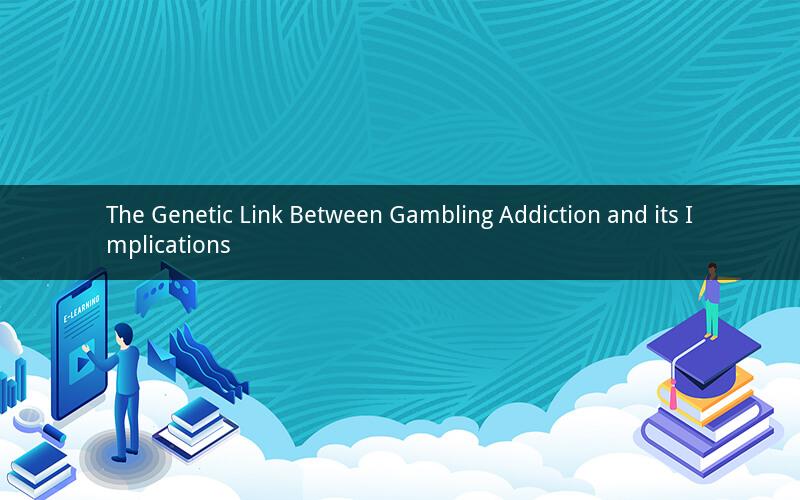
Introduction:
Gambling addiction, often referred to as pathological gambling, is a complex condition that affects individuals of all ages, backgrounds, and socioeconomic statuses. The debate over whether gambling addiction has a genetic component has been ongoing for years. This article explores the scientific evidence supporting the genetic link between gambling addiction and its implications for prevention, treatment, and understanding of the disorder.
1. Understanding Genetic Factors in Gambling Addiction
Genetic research has shown that certain genes may play a role in the development of gambling addiction. These genes can influence a person's vulnerability to addiction, the intensity of their cravings, and their ability to resist诱惑. While genetics alone do not cause gambling addiction, they can increase an individual's risk of developing the disorder.
1.1. The Role of Dopamine Receptors
One of the key factors in the genetic link to gambling addiction is the dopamine system in the brain. Dopamine is a neurotransmitter that plays a crucial role in the brain's reward and pleasure pathways. Research has shown that certain genetic variations in dopamine receptors can affect a person's sensitivity to rewards, making them more susceptible to the allure of gambling.
1.2. The Impact of Serotonin and Endorphins
Serotonin and endorphins are other neurotransmitters that may play a role in the genetic component of gambling addiction. Serotonin is involved in mood regulation, while endorphins are responsible for the release of pleasure and pain relief. Genetic variations in these neurotransmitters can impact a person's emotional state and their likelihood of developing an addiction.
2. Genetic Research and the Evidence
Several studies have been conducted to explore the genetic link between gambling addiction and its heritability. While the research is still ongoing, several key findings have emerged:
2.1. Twin Studies
Twin studies have provided valuable insights into the heritability of gambling addiction. These studies compare the risk of developing gambling addiction in identical twins, who share 100% of their genetic material, and fraternal twins, who share only 50%. The findings suggest that genetics account for a significant portion of the risk, with estimates ranging from 30% to 60%.
2.2. Family Studies
Family studies have also contributed to the understanding of the genetic link between gambling addiction. Research has shown that individuals with a family history of gambling addiction are at a higher risk of developing the disorder themselves. This suggests that genetic factors play a role in the transmission of gambling addiction within families.
3. Implications for Prevention and Treatment
Understanding the genetic component of gambling addiction has important implications for prevention and treatment strategies:
3.1. Early Intervention
Identifying individuals with a genetic predisposition to gambling addiction can allow for early intervention and prevention strategies. By recognizing the risk factors early on, individuals can be educated about the potential dangers of gambling and provided with resources to support their decision-making and self-control.
3.2. Tailored Treatment Approaches
Genetic research can inform the development of tailored treatment approaches for individuals with gambling addiction. By understanding the specific genetic factors that contribute to an individual's addiction, therapists and healthcare providers can develop personalized treatment plans that address the unique needs of each patient.
4. Ethical Considerations and Public Policy
The genetic link between gambling addiction raises ethical considerations and challenges for public policy. Some concerns include:
4.1. Privacy and Genetic Testing
Genetic testing for gambling addiction may raise privacy concerns, as individuals may be uncomfortable sharing their genetic information. It is important to ensure that individuals have control over their genetic data and that it is used responsibly.
4.2. Stigma and Discrimination
The discovery of a genetic predisposition to gambling addiction may lead to stigma and discrimination against individuals with the disorder. It is crucial to promote awareness and understanding of the condition to reduce the negative impact of stigma.
5. Future Research and Directions
Future research on the genetic link between gambling addiction should focus on several key areas:
5.1. Genetic Markers
Identifying specific genetic markers that contribute to gambling addiction can help in the development of diagnostic tools and treatment strategies.
5.2. Gene-Environment Interaction
Further research should explore the interaction between genetic factors and environmental influences on gambling addiction. Understanding how these factors interact can provide valuable insights into the development and progression of the disorder.
5.3. Longitudinal Studies
Longitudinal studies can provide a better understanding of the genetic and environmental factors that contribute to the development of gambling addiction over time.
In conclusion, the genetic link between gambling addiction and its implications is a complex and multifaceted topic. While genetics alone do not cause gambling addiction, they can increase an individual's risk of developing the disorder. Understanding the genetic component of gambling addiction can inform prevention, treatment, and public policy strategies. As research continues to evolve, it is essential to address the ethical considerations and promote awareness of this condition.
Questions:
1. How does the genetic component of gambling addiction affect the risk of developing the disorder?
2. What are the implications of genetic research for the development of tailored treatment approaches?
3. How can genetic testing for gambling addiction be used responsibly while protecting individual privacy?
4. What are the ethical considerations associated with the discovery of a genetic predisposition to gambling addiction?
5. How can longitudinal studies contribute to a better understanding of the genetic and environmental factors influencing gambling addiction?